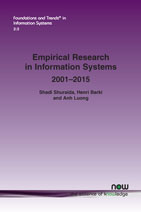Empirical Research in Information Systems: 2001–2015
By S. Shuraida, Baruch College, City University of New York, USA, Shadi.Shuraida@baruch.cuny.edu | H. Barki, HEC Montreal, Canada | A. Luong, Baruch College, City University of New York, USA
Abstract
While several studies have cast retrospective looks at IS research in order to define its boundaries, relatively little evidence exists regarding the main topics that IS researchers have empirically studied. In an effort to improve existing knowledge on this subject, the present paper first develops a relatively high-level, but sufficiently fine-grained framework that incorporates all constructs and relationships that have been examined by IS researchers. Then, it identifies all empirical papers published in four top IS journals (Journal of AIS, Journal of MIS, Information Systems Research, and MIS Quarterly) between 2001 and 2015 (a total of 1,361 papers), as well as the constructs and relationships they have studied, and incorporates them, as well as the number of times they were studied, onto the framework. The results provide an overall, yet a relatively fine-grained view of empirical research that has been published in these journals between 2001 and 2015, and can be useful for IS researchers by enabling them to identify potentially interesting and fruitful research areas.
Empirical Research in Information Systems: 2001-2015
Empirical Research in Information Systems: 2001-2015 provides a first step in providing empirical evidence and knowledge about the practical relevance of IS research. The monograph first develops a broad yet sufficiently fine-grained framework of IS research by integrating earlier frameworks. It then identifies all empirical IS research published from 2001 to 2015 in four top IS journals (Journal of the Association for Information Systems, Journal of Management Information Systems, Information Systems Research, and MIS Quarterly), and maps onto this framework all the constructs and relationships that were examined by the 1,361 empirical papers published in this 15-year period. Next, based on this mapping and by drawing on criteria proposed by organizational and IS researchers, it provides a preliminary assessment of the relevance of empirical IS research to practice, and discusses the study’s findings and their implications.
